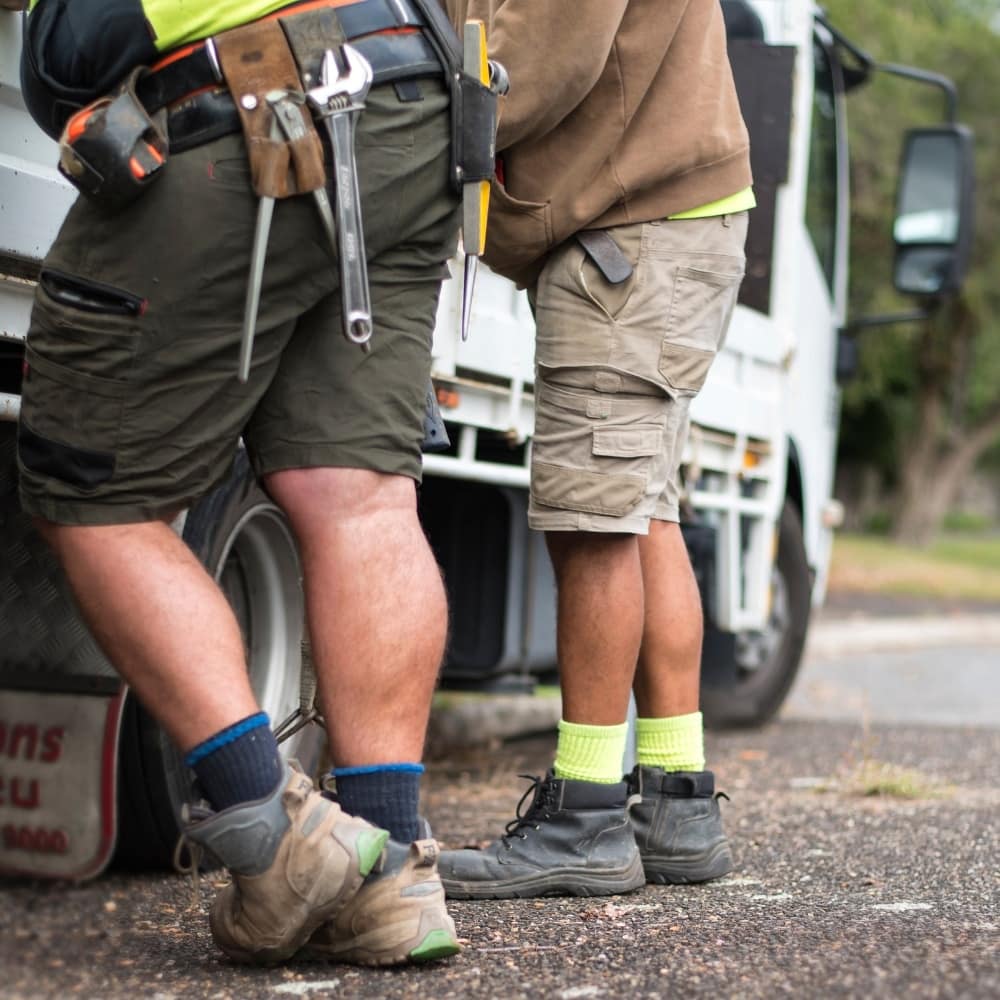When you need a task done around your home or business, you may require the services of a professional. Electricians, plumbers, carpenters—these are just a few examples of tradespeople, commonly referred to as “tradies”. But what is a tradie? Let’s delve into this topic, clarify common queries, and ensure that your experiences with tradies are positive.
Who Qualifies as a Tradie?

A tradie, short for “tradesperson,” is an individual skilled in a specific trade, often involving manual labor and specialized knowledge. Their skills are honed through a combination of education, training, and hands-on experience. Let’s explore the various facets that define a tradie:
- Apprenticeships and Training: Tradies typically begin their journey through apprenticeships, where they learn their chosen trade under the guidance of experienced professionals. This on-the-job training, often combined with classroom instruction, provides the foundational knowledge and expertise.
- Diverse Range of Specializations: Tradies can be found in a plethora of fields. Some common examples include:
- Electricians
- Plumbers
- Carpenters
- Bricklayers
- Tilers
- Mechanics
- Licensing and Certifications: Depending on the trade and region, a tradie might need specific licenses or certifications to operate. These licenses are a testament to the tradie’s skill and adherence to industry standards, ensuring that consumers receive quality work.
- Continuous Learning: The world of trades is ever-evolving. As technology advances and industry standards shift, tradies often engage in continuous learning to stay updated, ensuring they deliver top-notch services using the latest techniques and tools.
According to CEICdata In August 2023, employment figures for technicians and trades workers in Australia stood at 1,911,130 individuals, marking a decrease from the May 2023 count of 1,939,214.
How Old Do You Have to Be to Be a Tradie?

The world of trades offers a promising avenue for many looking for a fulfilling career path that emphasizes hands-on work and tangible results. But one common question that arises is the age factor. How young can one start, and are there age-specific regulations to be aware of?
- The Apprenticeship Pathway: Typically, the journey to becoming a tradie begins with an apprenticeship—a structured program that combines on-the-job training with classroom-based learning.
- Minimum Age Requirement: In Australia, the general age at which one can start an apprenticeship is 15 to 16 years. However, this can vary depending on state regulations and specific industries. It’s worth noting that some trades may have pre-apprenticeship programs available for younger individuals, providing a sneak peek into the world of trades.
- Factors Influencing Age Requirement: While the baseline age for starting an apprenticeship is generally consistent, several factors can influence this:
- Type of Trade: Some trades might demand physical maturity or specific skill sets that could affect the suitable age for entry.
- Regulations and Laws: Different states or territories might have variations in their age-related regulations for apprenticeships.
- Educational Prerequisites: Some trades might necessitate completion of certain educational levels, indirectly affecting the age at which one can begin.
- Maturity and Dedication Over Age: While age is an essential factor, it’s crucial to understand that the trade world values maturity, dedication, and passion. Many tradies who’ve found success in their fields often highlight their early interest and commitment as pivotal, regardless of when they formally started.
- Career Progression: While starting an apprenticeship is the entry point, becoming a fully-fledged tradie often requires several years of learning and experience. By the age of 20 to 24, many individuals find themselves well-established in their chosen trade, having completed their apprenticeships and possibly obtaining additional certifications or licenses.
What to Do If a Tradie Rips You Off?

Engaging with tradies for services, whether it’s for home renovations, electrical fixes, or plumbing, typically implies a significant investment of trust and funds. However, despite most tradies upholding high standards of workmanship and integrity, there might be instances where you feel shortchanged or taken advantage of.
How does one navigate such situations? Here’s a step-by-step guide to ensure fairness and resolution:
- Open and Calm Communication:
- Initiate a Conversation: Before jumping to conclusions, it’s essential to have a clear and calm conversation with the tradie about your concerns. Misunderstandings can often be resolved amicably through open dialogue.
- Specify Your Concerns: Clearly outline where you feel the service wasn’t up to the mark, providing examples or evidence if possible.
- Document Everything:
- Maintain Records: From the initial quote to invoices, any written communication, and the work’s photographic progress, ensure you have all relevant documents and evidence in order.
- Chronological Documentation: A timeline of events can help in understanding the sequence and pinpointing where things might have gone awry.
- Seek Mediation:
- Professional Bodies: Many trades have associated professional bodies or organizations that can offer mediation services to help resolve disputes.
- Third-party Mediation: In instances where no direct professional bodies exist or if they’re unable to mediate, consider seeking independent mediation services. They can offer an unbiased perspective and help both parties reach a resolution.
- Engage with Their Employer or Company:
- Higher Management: If the tradie is part of a larger organization or company, consider raising your concerns with higher management or the customer service department.
- Feedback Systems: Many companies have internal feedback systems or complaint procedures in place, which can be leveraged for resolution.
- Contact Consumer Protection Bodies:
- Lodge a Formal Complaint: If you believe you’ve been genuinely wronged and initial steps don’t yield results, you might consider contacting consumer protection agencies. They can provide guidance on your rights and possible recourse actions.
- Awareness: Being aware of your consumer rights can empower you in these situations, ensuring you’re not taken advantage of.
- Legal Recourse:
- Seek Legal Counsel: If all else fails and the matter is severe, consider seeking legal advice. A lawyer specializing in consumer rights or contractual disputes can guide on the best way forward.
- Small Claims Court: For less significant disputes, the small claims court might be an xappropriate avenue, providing a quicker resolution without the complexities of a full-fledged legal battle.
How Do You Complain About a Tradie?

If direct communication doesn’t resolve the issue:
- Contact Their Employer: If the tradie is part of a larger company, raise your concerns there.
- Trade Associations: Report the issue to their relevant professional or trade association.
- Consumer Protection Agencies: These agencies can guide you on your rights and possible actions.
All About Tradies
How do I verify a tradie’s credentials?
You can ask for their qualifications, licenses, or certifications relevant to their trade. Many professional bodies also maintain directories or lists of certified members which you can refer to.
Why do prices vary among tradies?
Costs can vary based on the tradie’s experience, specialization, demand, and the complexity of the job. Always ensure you’re comparing apples to apples—similar service quality, materials, and timelines.
Is it necessary for a tradie to have insurance?
Yes, it’s crucial. Insurance protects both the tradie and the client in case of accidents, damages, or unforeseen events during the job. Always ask for proof of insurance before commencing any project.
How can I ensure I’m getting a fair quote?
It’s a good practice to obtain multiple quotes from different tradies. This not only provides a ballpark figure for the job but also gives insights into different approaches and materials suggested.
Can I negotiate with a tradie on the price?
While many aspects of a quote are based on fixed costs, there’s no harm in discussing the price. However, remember that quality workmanship has its value, so it’s essential to strike a balance between cost and quality.
What if the work takes longer than initially quoted?
Projects can sometimes face unexpected delays. It’s essential to have clear communication and perhaps a written agreement outlining potential additional costs or changes in timelines.
How do I ensure the quality of work?
Regularly check on the progress, ask for updates, and don’t hesitate to raise concerns. Additionally, some trades might offer guarantees or warranties on their work, so always inquire about these.
Can I ask for references from a tradie?
Absolutely! Most seasoned tradies would be more than willing to provide references or showcase their past projects to give you a sense of their work quality and style.
What should I do if I’m unsatisfied with the work?
Open a line of communication with the tradie to discuss your concerns. If that doesn’t resolve the issue, you can follow the steps highlighted in the sections above on “What to Do If a Tradie Rips You Off?” and “How Do You Complain About a Tradie?”
Navigating the World of Tradies with Confidence
Understanding what a tradie is and how they operate can empower you to make informed decisions when hiring and collaborating with these professionals. However, in the fast-paced Australian economy, it’s not just about the skills in your trade but also about how you present and market yourself.
At Tradiemark.com, we appreciate the immense value tradies bring. As a dedicated marketing, brand, and design agency, we’ve tailored our services to help tradies shine brightest. Whether it’s innovative logo designs, impactful site signage, or a state-of-the-art website, we’ve got your back.
Ready to elevate your tradie business? Let’s collaborate and pave your way to success. Contact us today and let’s get started!

